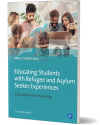Maura Sellars, author of the Budrich title Educating Students with Refugee and Asylum Seeker Experiences – A Commitment to Humanity, agreed to reply to our 5 questions. Before we start, a short CV is given by the Maura Sellars:
 I teach as a lecturer in numeracy, pedagogy and primary mathematics at the University of Newcastle, NSW, Australia. I have been a classroom teacher for almost thirty years and have published works on reflective practice for teachers, using students’ strengths in education and on numeracy across all discipline areas and have most recently developed a manuscript focussed on the education of students with refugee and asylum seeker experiences. I have published work on integrated curriculum, critical thinking and education for the future, school belonging and wellbeing and on the experiences of refugee students in Australia. I am currently working on research projects focussed on developing inclusive learning environments and involving all students in inductive teaching and learning strategies in primary mathematics classrooms.
I teach as a lecturer in numeracy, pedagogy and primary mathematics at the University of Newcastle, NSW, Australia. I have been a classroom teacher for almost thirty years and have published works on reflective practice for teachers, using students’ strengths in education and on numeracy across all discipline areas and have most recently developed a manuscript focussed on the education of students with refugee and asylum seeker experiences. I have published work on integrated curriculum, critical thinking and education for the future, school belonging and wellbeing and on the experiences of refugee students in Australia. I am currently working on research projects focussed on developing inclusive learning environments and involving all students in inductive teaching and learning strategies in primary mathematics classrooms.
1) What will be the main challenge for your research field in the coming years?
The whole notion of schooling and education is problematic as educationalists in neoliberal countries have looked backwards and not to the future of the human species and the world in which we live. A major challenge will be to authentically educate students to participate ethically in multi-perspectival global discourses and to use what is known about the learning process to make a positive impact on the experiences that students have in formal educational contexts. These challenges impact on every sphere of life – social, political, economic – and need to be examined in the contexts of the current climates of exclusion, inhumane and immoral impacts of educational practices and human rights.
2) Why would anyone want to pursue research in your field?
What is critical is an understanding that in neoliberal contexts, schooling is not education. It is an impoverished version that is based on economies and efficiencies of factory models which embed, as a matter of course, some failures – the system rejects.
3) Why did you choose your research field? What motivates you in your field in particular?
Childhood has, for many students, become something of a competitive nightmare in formal educational contexts. The conditions and considerations under which some students come to these learning institutions further distances and disenfranchises them from equitable opportunities to change their predestined futures and build hope for a transformed society. I believe in the power of education. I am increasingly dismayed at the measures and accountabilities that prevent educational professionals from undertaking their work with compassion, commitment and consideration for the real lives of their students.
4) Which (academic) book has influenced you the most?
There are very many authors who have touched my heart, conscience and professional ethics. The one I could single out, amongst the multitude, is How Children Fail; a text I was introduced to many years ago as a student teacher.
I am author with Barbara Budrich because …
… when she was recommended to me by a publishing house for whom I was already an author, I found a vast array of interesting educational publications – many of which would not be considered by large impersonal publication houses with agenda that supports conservative markets at the expense of innovation, creativity and, in my case, addressing ‘the elephant in the room’.
Published by Budrich:
 Maura Sellars: Educating Students with Refugee and Asylum Seeker Experiences – A Commitment to Humanity.
Maura Sellars: Educating Students with Refugee and Asylum Seeker Experiences – A Commitment to Humanity.

